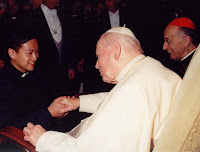 Today, October 27, 2007, the Philosophical Association of the Philippines (of which I am member of the board of directors) is holding its midyear conference at Don Bosco Technical Institute, Makati City, with the theme "The Philosophical Thought of Richard Rorty". I was tasked to lead the assembly into prayer at the beginning of the meeting. Here is the text of the invocation.
Today, October 27, 2007, the Philosophical Association of the Philippines (of which I am member of the board of directors) is holding its midyear conference at Don Bosco Technical Institute, Makati City, with the theme "The Philosophical Thought of Richard Rorty". I was tasked to lead the assembly into prayer at the beginning of the meeting. Here is the text of the invocation.Heavenly Father,
In the wonderful account of creation, you made the human being in your own image, after your likeness—and at that moment, poetry was born, the beauty of the utterance called language came into sight, together with the manifestation of man’s creativity: music, crafts, science and the creative flow of ideas both oral and written. You have indeed shared with us this beautiful power.
This endowment we see in your gift to humanity—in the person of Richard Rorty, a philosopher who has greatly contributed to the endeavor of searching for truth, of asking the questions that really matter, and of being one who loved leading people—in his words in the classroom, to the nation, to the whole world.
May we who gather here learn from this man who moved others through the ideas that flowed from the mind you have endowed him. May we as philosophers, professors and students be interested in the truth and continually learn and proclaim to others the beauty of this truth.
And as was sung in the song “Est-il de vérité plus douce que l'espérance?” Is there a truth sweeter than hope? This search for truth we do in hope and that is why we call upon you today to touch our minds and hearts through this man.




